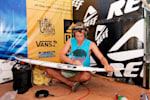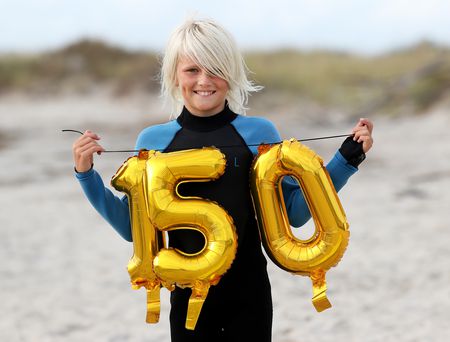
Standing at the edge of the cold, grey Bristol Channel, watching the waves crash towards Croyde Beach, Devon, I’m wondering why I’m not starting my surfing journey somewhere more tropical (see below for surf hotspots in warmer climes). Kitted out in a wetsuit, neoprene shoes, gloves and even a balaclava, I’m not convinced I’ve nailed the look either – this season’s runways and years of surf subculture’s influence on fashion tell a far more stylish story. Surfing Croyde Bay’s instructor, Jake, meanwhile, has all of that elusive, effortless cool; and adopting his enthusiasm for the water is, I quickly realise, the only way forward.
As soon as we’re in the sea, all thoughts, worries and stresses are pushed immediately to the back of my mind. Instead, the focus is acutely on battling out far enough from the shore with the board, identifying your chosen wave, hoisting yourself up, and if you catch it, riding the wave all the way back to the beach. Proficiency is still a long way off, but the first taste of what surfers call “stoke” – that clear-headed adrenaline rush that only the ocean brings – is enough to make me want to come back for more.

Later, Tom Hewitt MBE speaks further about that particular feeling. His charity, Surfers Not Street Children, has been working with street children in Durban, South Africa since 2012 – and in Tofo, Mozambique since 2018 – with phenomenal success; Hewitt estimates the charity has helped 1,800+ children to date. “If you ask a kid who’s living on the streets if they want help or counselling, what’s the answer? Of course not. Ask them if they want to go surfing? That’s cool.” It’s in this way that the charity builds relationships with the children, via a drop-in surf clubhouse on the beach and progressing to a live-in programme for those who choose to, prioritising their independence throughout. One of the charity’s main initiatives this year is the #GirlsSurfToo campaign, seeking to empower girls – one of the most vulnerable groups on the street – through surfing.
For mental health, rehabilitation and even just a reconnection with the self – in this case simply being a child – Hewitt says there’s nothing like the power of surfing. Children go on to compete in global championships and become surf coaches, lifeguards and swim instructors on the Surfers Not Street Children projects. And ambassadors for the charity include Prince Harry, the Pope and professional surfer Kelly Slater – further proof that this is a sport for everyone.

Back in Devon, there’s also the post-surf culture. The Chalet Saunton (above), overlooking Saunton Sands – another perfect beginners’ beach in the area – has all the style of a luxury hotel, complete with a laid-back coastal mood. Floor-to-ceiling windows flood the space with light and frame the ever-changing vista across the bay; deep indulgent baths soak away the aches from just carrying the surfboard (it’s hard work); artwork themes each apartment; BBQs provide the essential refuel; and the North Devon Coast’s AONB (area of outstanding natural beauty) and ASSI (area of special scientific interest) protected paths are right on its doorstep.
Whether you’re looking for an active refresh away from the daily grind or to really make a difference, surfing could be the answer.

Top global surf destinations for beginners, as recommended by Vogue editors around the world:
Cádiz, Rodiles or Mogro, Spain
On the south-west coast of Spain, Cádiz is known for its friendly vibe and good waves. Cádiz Surf Center’s highly trained instructors (the owners Tony Peñalver Parra and Jacob Real Hernández have been surfing for over 30 years and coaching for over 10) offer a complete programme, from one-to-one lessons to groups of no more than eight students, plus top-quality board and wetsuit hire.
Along the north coast of Spain, make the most of the scenic beaches and (slightly colder) waves with Special Surf School, owned by brothers Dani and Raúl García. Test your skills in both surfing and Stand Up Paddleboarding (SUP) in Rodiles, Asturias and Mogro, Cantabria.
Cascais, Portugal
On the south coast of Portugal, just outside Cascais, The Blue Room Surf School is co-founded by pro-surfer Frederico “Kikas” Morais – the only Portuguese surfer featured in the top 26 of the World Surf League. Group classes are small, between two to five students, and the instructors have extensive experience, a real passion for the sport and focus on building confidence in beginners.

Ichinomiya in Chiba Prefecture, or Izukyu-Shimoda in Shizuoka Prefecture, Japan
Chosen as the surfing location for the 2020 Olympics (the first time surfing has been on the Olympic line-up), Ichinomiya is easily accessible from central Tokyo – just one-and-a-half hours on the train – and less busy than some of the more famous spots, such as Kamakura, on the other side of Tokyo Bay. Head to Naki Surf (surf schools are often run by the local surf shops) by Ichinomiya Beach or Taito Beach for relaxed surf conditions.
A little further out from central Tokyo – two to three hours on the train – Izukyu-Shimoda is one of the best spots to escape the crowds, with Hawaii-level crystal waters and calm waves. Try Iritahama, Tatadohama or Shirahama beaches, and surf schools Pink Mafia or Surfshop Real.
Donghe, Taiwan
The east coast of Taiwan has some of the island’s best waves, and the small fishing village of Donghe is one of the best places to find them (plus warm waters all year round). Beginners should head to Wa Ga Li Gong surf school – it also offers SUP tours of the coast, windsurfing and kayaking. Head up to the bar and restaurant’s roof terrace for a well-earned rest in one of the hammocks after class.

Sydney, or Newcastle, Australia
Surfing is almost a rite of passage in Australia, so there are lots of places to choose from. Manly Surf School is a good starting point, covering six locations just outside of central Sydney (Manly, Collaroy, Long Reef, Palm and Balmoral Beaches and Narrabeen Lakes). The classes cater to all ages and abilities, with friendly, helpful instructors – many of whom are current or ex-professional surfers. It also offers SUP for an (arguably easier) alternative.
If you’re exploring a little further up the coast, Newcastle Surf School is a well-established, fun place to learn, offering quality equipment and daily lessons all year round at Nobby’s, Blacksmiths and Caves beaches.
For more information on how to donate or volunteer with Surfers Not Street Children head to its website here.
Vogue travelled to Devon with iChauffer, a four-hour drive from London. Staying at The Chalet Saunton (above) costs from £400 (AU$733) per night, based on a self-catering apartment sleeping up to six people.





Recent Comments